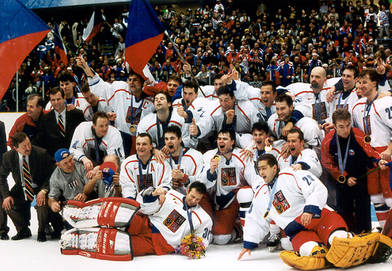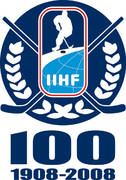

Story #10 Czech Republic wins first “open” OlympicsFebruary 22, 1998 – Nagano, Japan
Although the Czech Republic could not have won gold at the 1998 Olympics without goalie Dominik Hasek, it was Petr Svoboda of the Czech Republic who was the final hero of the tournament, the first Olympics which included full participation of NHL players. Hasek had led the team to the gold-medal game by stopping all five Canadian players in a semi-finals shootout win, but it was Svoboda who scored the lone goal in the final game of the Olympics against Russia.  After the medal ceremony, Hasek said: "When I saw the flag go up, I saw my whole career flash before my eyes from the first time my parents took me to a hockey game until now." The team flew to Prague the next day for a celebratory parade, and estimates of more than a million people in the national capital speak to the win not just as a sporting moment of Czech history but a cultural one as well. About the Top 100 StoriesAs part of the IIHF's 100th anniversary celebrations, www.IIHF.com is featuring the 100 top international hockey stories from the past century (1908-2008). Starting now and continuing through the 2008 IIHF World Championships in Canada, we will bring you approximately three stories a week counting down from Number 100 to Number 11.
The Final Top 10 Countdown will be one of the highlights of the IIHF's Centennial Gala Evening in Quebec City on May 17, the day prior to the Gold Medal Game of the 2008 World Championship.
These are the criteria for inclusion on this list: First, the story has to have had a considerable influence on international hockey. Second, it has to have had either a major immediate impact or a long-lasting significance on the game. Third, although it doesn't necessarily have to be about top players, the story does have to pertain to the highest level of play, notably Olympics, World Championships, and the like. The story can be about a single moment — a goal, a great save, a referee's call — or about an historic event of longer duration — a game, series, tournament, or rule change. |
 Click here for the 100 Top Stories
|
|






